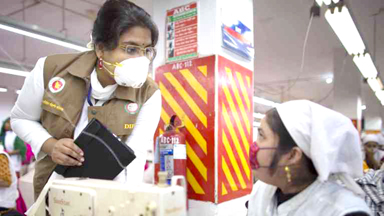DE Online Desk
Occupational safety and health frameworks are proving to be effective means of preventing and addressing violence and harassment in the world of work, a new International Labour Organization report says.
The report aims to shed light on how occupational safety and health regulatory frameworks can help prevent violence and harassment, reads a press release issued on Wednesday.
The report highlights whether the general duty of care for workers’ health provided for by occupational safety and health legislation is sufficient to prevent violence and harassment at work.
It also focuses on the type of regulations best suited for work environments that provide safety and dignity.
In Bangladesh, occupational safety and health are primarily regulated by the Bangladesh Labour Act, which outlines the responsibilities of employers, workers and the labour inspectorate. The government also developed the National Occupational Safety and Health Policy 2013 and the Domestic Workers Protection and Welfare Policy 2015 to promote health, safety and dignity in the world of work.
Occupational safety and health in Bangladesh have recently focused on hazards related to physical health and safety, the report says.
“On violence and harassment, the Labour Act provides protection for women at work in Section 109, which prevents a woman being made to work at night without her consent, and Section 332, which stipulates that no one in the workplace shall behave with a woman ‘[in a way] which may seem to be indecent or unmannerly or which is repugnant to the modesty or honour of that woman.’”
“It is understandable that Bangladesh’s OSH (occupational safety and health) framework is focused on prevention and physical safety of workers given the history of industrial accidents and disasters. These new findings show that Bangladesh can leverage and expand the scope of its OSH frameworks to also address violence and harassment at the workplace,” says Tuomo Poutiainen, the ILO’s country director for Bangladesh.
Bangladesh has made notable progress in improving occupational safety and health in the readymade garment (RMG) sector but faces challenges in extending the two as well as protection against violence and harassment in other sectors, including in the informal economy, the report says.
The report, titled “Preventing and addressing violence and harassment in the world of work through occupational safety and health measures,” is part of a research project aimed at providing practical guidance and tools to prevent and address violence and harassment in the world of work.
Jointly funded by the European Commission and the ILO, the research findings are under discussion at a global conference taking place at the ILO headquarters in Geneva on Wednesday, the press release adds.
The report highlights and lauds the Bangladesh Supreme Court’s critical role in the prevention and elimination of sexual harassment, resulting in changes in the labour law. In 2009, the High Court Division of the Supreme Court issued directives in the form of guidelines on sexual harassment for all workplaces and educational institutions in both the public and private sectors.
The directives require all organizations to form complaint committees to receive sexual harassment-related complaints, conduct investigations and make recommendations.
They also provide for preventive measures, such as regular training and information dissemination on gender equality and the prohibition of sexual harassment and place a general obligation on employers to ensure a workplace that is not hostile to women employees.
Their implementation and enforcement are crucial for making the world of work in Bangladesh a safe and dignified place for women, the press release says.
ILO acknowledges Bangladesh’s efforts in occupational safety, health for safer workplace

Leave a comment








